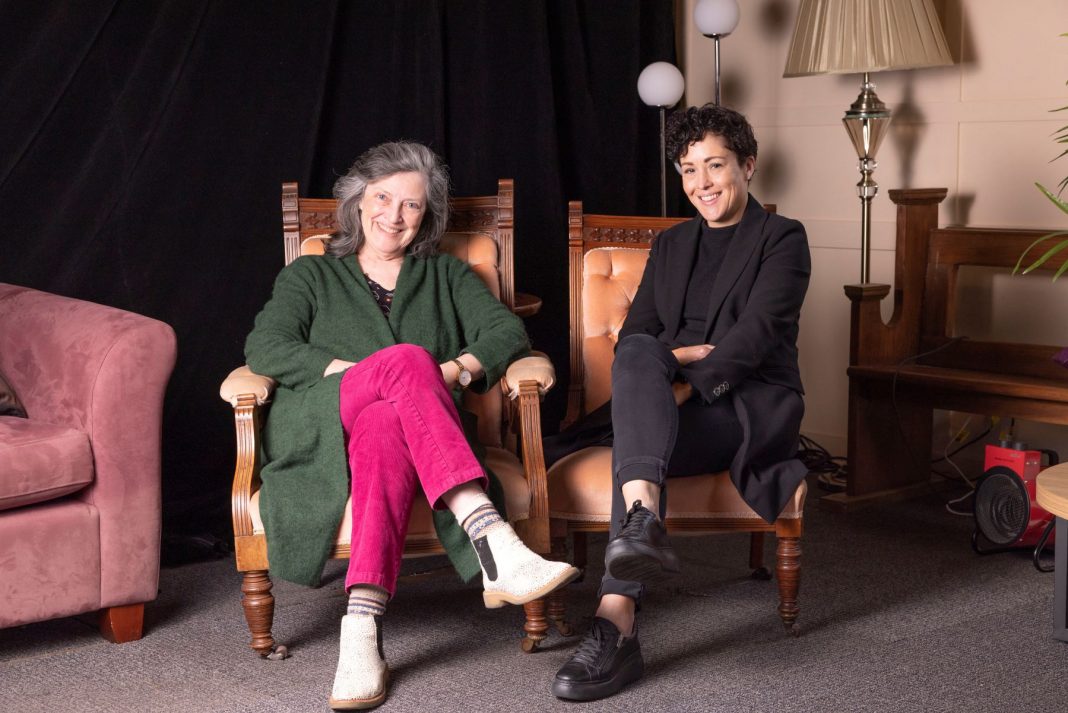From Mad Max to Waterworld and Terminator, there is no shortage of post-apocalyptic doomsday productions for our viewing pleasure, capturing a world far removed from ours. What happens when doomsday is now, and the enforcer isn’t a robot from the future but the consequences of our actions? Exploring the aftermath of disaster, The Children comes to ACT Hub in Kingston from 31 August to 9 September.
In a small cottage on the East Coast live two retired nuclear scientists, Hazel and Robin, farming and trying to live a healthy lifestyle. One day, an old colleague, Rose, comes to their door. Reuniting after many years, Rose’s intention isn’t immediately clear, but we soon learn more about the scientist’s history and motivations.
“The women are friendly, but a little bit spiky at times, but they have more in common than they don’t. It’s about relationships and how we deal with one another, it’s also about how we deal with footprints on the greater world,” says Karen Vickery, who plays Hazel.
Ms Vickery, who is also the artistic director of Chaika Theatre, says ‘the children’ of the title are both real and metaphorical. Hazel and Robin raised four children and now have grandchildren, who they adore. At the same time, the children also encompass all the younger people who have been subjected to the doomsday-style event that has occurred.
Inspired by the 2011 Fukushima nuclear accident, where nature and the manmade collided, an earthquake and tsunami triggered hydrogen explosions and core meltdowns at the Fukushima Daiichi Nuclear Power Plant. The play has a different setting, aftermath and background, and is relevant to many concerns society holds today.
“In terms of the environment, the impact of energy sources, nuclear fission – potentially catastrophic impacts but also incredibly clean energy. Where do we sit with that? I know that over my lifetime that debate has shifted enormously,” says Ms Vickery.
“Our impact on the planet, what are we responsible for, what do we owe to the younger generation?” adds Sophie Benassi, director of The Children.
While the play centres on scientists and science, it has a focus on the human elements – our debates, and philosophical questions.
“Anyone can engage in the question: how do you think we should live? What should we do now that this has happened, what should be the next steps with the world heating up, what should we be doing?” says Ms Vickery.
Showcasing works of substance and bite, Chaika Theatre wants to offer something for audiences to really sink their teeth into. While the light and fluffy is enjoyable for some, Ms Vickery prefers to leave the theatre richer than when she entered. The debates in this production have you questioning the beliefs you thought you knew and asking what you would do in this situation.
“That was so interesting, I found that I would go ‘Oh, I really agree with that’ and ‘I love that about them’ and it comes from all three at different stages and continues to change and evolve,” says Ms Banessi.
A clever play with meat on its bones, Ms Vickery says there are small moments that at a glance might seem superficial, but nothing is; everything is connected and adds to the story.
“There’s an example of a phone conversation that happens … my character has a conversation with a taxi driver, and he says his baby daughter is unwell and it’s never said, but when you hang up the phone, you think that’s radiation sickness,” says Ms Vickery.
While facing the world after a disaster may sound like a heavy topic, the play is full of moments of light, life, and love. There is dance, banter, squabbling, laughter and then some big decisions; the characters are relatable and human.
“The first time I heard it read, I felt like I had been hit by a truck – but not badly, in a good way. I was like ‘I have never thought of these things and what is the answer?’ Every time I read it again or saw it again, there is more understanding and ideas; it is literally like a light globe flashing,” says Ms Benassi.
Throughout the play, other characters are mentioned or spoken to, though we only see our three ageing scientists. Having a piece of theatre written specifically for an older cast, especially by a young playwright, Lucy Kirkwood in this case, is refreshing for the creatives.
“Stories about older people are rich in a way that stories about young people are not because of the way in which their experiences have marked them and impacted on them,” says Ms Vickery.
Hoping to inspire people to get back into the theatre to see local live performances, the women want audiences to leave keen to discuss what they have just seen. Ms Vickery says not every play leaves a lasting impact on her, but there is something in the immediacy and relevance of The Children that has her researching alternate recycling systems.
“Just thinking about what is wastage, how much plastic I’m using. That’s the thing that is so clever; it doesn’t make you feel bad. It just offers so many opinions and ideas intertwined,” Ms Vickery says.
“You see people living hand to mouth which they’re not used to, they never have before. Because you witness that lifestyle and how simple it is, you think we do spend an awful lot of time, energy and money keeping ourselves entertained,” she says.
Chaika Theatre presents The Children at ACT Hub, 31 August-9 September; acthub.com.au
Get all the latest Canberra news, sport, entertainment, lifestyle, competitions and more delivered straight to your inbox with the Canberra Daily Daily Newsletter. Sign up here.



